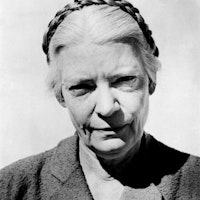The greatest challenge of the day is: how to bring about a revolution of the heart, a revolution which has to start with each one of us.
The greatest challenge of the day is: how to bring about a revolution of the heart, a revolution which has to start with each one of us.
Dorothy Day

A Revolution of the Heart
Theme: Serving
The greatest challenge of the day is: how to bring about a revolution of the heart, a revolution which has to start with each one of us. When we begin to take the lowest place, to wash the feet of others, to love our brothers with that burning love, that passion … then we can truly say, ‘Now I have begun.’
Dorothy Day was born on November 8, 1897, in Brooklyn, New York, United States. Her family later moved to California and then to Chicago, where she developed an early interest in literature and social justice. After two years at the University of Illinois, she moved to New York City and worked as a journalist for socialist publications such as The Call and The Masses. In 1917, she was jailed for participating in women’s suffrage protests. These early years shaped her lifelong commitment to political engagement and social change.
In 1927, after the birth of her daughter, Dorothy Day entered the Catholic Church. She later described her conversion in The Long Loneliness (1952), reflecting on how faith deepened, rather than replaced, her concern for the poor. In 1933, with Peter Maurin, she co-founded the Catholic Worker Movement and began publishing the Catholic Worker newspaper. The movement combined the works of mercy—offering food, shelter, and support to those in need—with nonviolent resistance and a critique of both capitalism and state socialism. Day remained editor of the newspaper until her death.
Throughout her life, Dorothy Day practiced civil disobedience in response to war, injustice, and poverty. She was arrested multiple times for refusing to participate in civil defense drills and for supporting striking workers. Her work attracted both support and criticism, but she remained consistent in her stance on pacifism, distributive justice, and personal responsibility. She died on November 29, 1980, at Maryhouse in Manhattan. The Catholic Church later opened her cause for canonization and recognizes her as a Servant of God.
Loaves and Fishes
Day, Dorothy. Loaves and Fishes. Orbis Books, 1997.

Dorothy Day
Theme: Serving

About This Dorothy Day Quotation [Commentary]
Dorothy Day’s call for a “revolution of the heart” centers on the idea that real change begins within each individual. “The greatest challenge of the day,” she writes, “is how to bring about a revolution of the heart, a revolution which has to start with each one of us.” This inward turning is not isolated from the world—it is the starting point for how we live with others. By beginning with the heart, Day calls for a transformation that shapes how we perceive dignity in every person and how we respond with care.
She names the acts that mark this transformation clearly: “When we begin to take the lowest place, to wash the feet of others,” we are living a new way. These gestures—drawn from the language of service—reflect a deliberate choice to move toward humility, not self-importance. For Dorothy Day, taking the lowest place is not about self-deprivation, but about recognizing the value of others. To “wash the feet of others” is to restore their dignity through attention, respect, and presence. In doing so, both the one serving and the one being served are changed.
This way of living is not abstract or reserved for extraordinary people. It begins with small, ordinary actions made in love. In her words, “we can be responsible only for the action of the present moment.” From this starting point, the revolution of the heart moves outward—not by force or command, but by service that honors human worth. When we choose this way, Dorothy Day writes, “then we can truly say, ‘Now I have begun.’”
Dorothy Day
Dorothy Day (8 November 1897 – 29 November 1980) was an American journalist turned social activist. A pacifist and a devout member of the Catholic Church, she advocated distributism and was a co-founder, with Peter Maurin, of the Catholic Worker movement. She authored several books and spoke often in public about faith and social justice.
The Context Passage For This Dorothy Day Quotation [Excerpt]
“One of the greatest evils of the day among those outside the proximity of the suffering poor is their sense of futility. Young people say, ‘What good can one person do? What is the sense of our small effort?’ They cannot see that we must lay one brick at a time, take one step at a time; we can be responsible only for the action of the present moment but we can beg for an increase of love in our hearts that will vitalize and transform all our individual actions, and know that God will take them and multiply them, as Jesus multiplied the loaves and fishes.
The greatest challenge of the day is: how to bring about a revolution of the heart, a revolution which has to start with each one of us. When we begin to take the lowest place, to wash the feet of others, to love our brothers with that burning love, that passion, which led to the cross, then we can truly say, ‘Now I have begun.’”
Additional Dorothy Day Quotes
“We cannot love God unless we love each other, and to love we must know each other. We know Him in the breaking of bread, and we know each other in the breaking of bread, and we are not alone anymore. Heaven is a banquet and life is a banquet, too, even with a crust, where there is companionship.”
–Dorothy Day [The Long Loneliness: The Autobiography of the Legendary Catholic Social Activist].
Resources
Related Quotes
Copyright © 2017 – 2026 LuminaryQuotes.com About Us